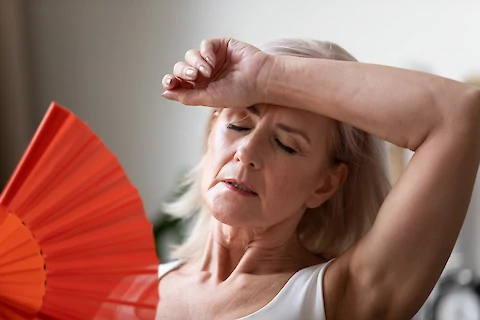
With age comes an increased risk of heat stroke, which can have severe consequences if not recognized and treated promptly. That's why we've created this helpful guide for adult children who care for their elderly relatives.
In this blog post, we'll discuss the risks of heat stroke in seniors, how to identify symptoms, and what preventive measures can be taken to ensure their safety. We'll also advise on the steps to follow if you suspect a loved one is experiencing heat stroke.
By staying informed and vigilant, we can help protect the seniors in our lives and make sure they enjoy a happy, healthy summer.
Seniors' Higher Risk of Heat Stroke
Seniors are more susceptible to heat stroke due to several age-related factors. As we age, our body's ability to regulate temperature decreases, making it harder to cool down when exposed to high temperatures. Seniors often have chronic medical conditions or take medications that can affect hydration and body temperature regulation, further increasing their risk for heat stroke.
The consequences of heat stroke can be severe and even life-threatening for seniors. Heat stroke can cause organ damage, long-term disability, and in severe cases, death. Therefore, it is crucial to understand the risks and take appropriate steps to protect our loved ones during the hot summer months.
Identifying Symptoms of Heat Stroke in Seniors
Recognizing the symptoms of heat stroke in seniors is key to ensuring their safety. The following are some common signs to look out for:
- High body temperature
- Altered mental state or behavior, such as confusion, agitation, or slurred speech
- Nausea and vomiting
- Rapid, shallow breathing
- Rapid, weak pulse
- Flushed skin
- Lack of sweating despite the heat
- Fainting or unconsciousness
If you notice any of these symptoms in your senior loved one, take immediate action.
Preventative Measures for Seniors
Taking preventive measures is critical to the safety of seniors during hot weather. Here are some tips on how to help your loved one stay safe:
Keep Them Hydrated
Encourage seniors to drink water regularly throughout the day, even if they don't feel thirsty. Avoid alcohol and caffeinated beverages, as they can lead to dehydration.
Keep Them Cool
Use air conditioning or fans to keep the living environment comfortable. Encourage them to wear lightweight, loose-fitting clothing, and suggest taking cool showers or baths as needed.
Limit Their Sun Exposure
Encourage seniors to stay indoors during the hottest part of the day. When outdoors, make sure they use sunscreen and wear protective clothing, such as hats and sunglasses.
Monitor Weather Conditions
Stay aware of heat advisories and warnings in your area. Plan activities accordingly to avoid exposure to extreme heat.
Five Steps to Follow if a Senior May Be Experiencing Heat Stroke
If you suspect that your loved one is experiencing heat stroke, you've got to act quickly. Follow these steps:
- Call 911 immediately, as heat stroke requires emergency medical attention.
- Move the person to a cooler environment, such as an air-conditioned room or shaded area.
- Remove excess clothing to help cool the body down.
- Use cold water, ice packs, or a cool cloth to help lower their body temperature.
- Stay with the person until help arrives, monitoring their condition and providing comfort.
Stay Cool With Senior Helpers Torrance
Understanding the risks of heat stroke in seniors and taking the necessary preventive measures can help ensure their safety during the hot summer months. By staying informed and proactive, we can protect our senior loved ones and make sure they enjoy a happy and healthy summer season.
If you live in Torrance, Palos Verdes, Manhattan Beach, Redondo Beach, or Westchester and need assistance in caring for your senior loved ones during the hot summer months, contact us at Senior Helpers Torrance. Our dedicated team of professionals is here to provide the support and in-home care necessary to ensure your loved one's safety and well-being.